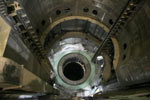 AFP: Iran’s first nuclear plant, scheduled to go online this weekend, is not a major proliferation risk, despite international concerns about the nature of Tehran’s atomic programme, experts said Friday.
AFP: Iran’s first nuclear plant, scheduled to go online this weekend, is not a major proliferation risk, despite international concerns about the nature of Tehran’s atomic programme, experts said Friday.
by Simon Morgan
 VIENNA, August 20, 2010 (AFP) – Iran’s first nuclear plant, scheduled to go online this weekend, is not a major proliferation risk, despite international concerns about the nature of Tehran’s atomic programme, experts said Friday.
VIENNA, August 20, 2010 (AFP) – Iran’s first nuclear plant, scheduled to go online this weekend, is not a major proliferation risk, despite international concerns about the nature of Tehran’s atomic programme, experts said Friday.
The Russian-built plant in the southern port city of Bushehr is set to be launched on Saturday, following more than three decades of delay. But it will be months yet before it actually starts generating electricity.
Western countries — and the United States in particular — are convinced that Iran is seeking to build an atomic bomb under the guise of a peaceful civilian nuclear programme, a charge which the Islamic republic vehemently denies.
And some observers have expressed concern that nuclear fuel from Bushehr could be diverted and used to build a weapon.
But non-proliferation experts disagree, arguing that Iran’s other nuclear activities, notably its extensive uranium enrichment programme which it has built up in defiance of four rounds of UN sanctions, were of greater and more immediate concern.
“Bushehr is not a proliferation risk as long as it is run to produce power for electricity generation,” said Mark Fitzpatrick, an expert in non-proliferation at the International Institute for Strategic Studies in London.
“It would be a risk if Iran operated it differently, i.e. for short periods at low-burn up in order to produce weapons-usable plutonium — but in this case the IAEA would know,” the expert said, referring to the UN atomic watchdog, the International Atomic Energy Agency.
IAEA inspectors, already monitoring all of Iran’s declared nuclear activities, will be on the ground in Bushehr to oversee the introduction of the fuel into the reactor core. And the plant is also under full agency safeguards, meaning inspectors will always be keeping a close eye on Bushehr during the start-up phase and when it is finally up and running.
They will also ensure that all of the spent fuel is returned to Russia as agreed.
The international community would therefore know “if Iran tried to divert the spent fuel to reprocess the plutonium or to divert the fresh fuel to re-enrich it to higher levels,” Fitzpatrick said.
The expert argued that inflammatory statements about Bushehr could divert attention “from the real proliferation risks posed by the enrichment facilities and the research reactor at Arak, which, unlike Bushehr, is ideally suited for plutonium production”.
And he concluded: “Condemning the start-up of Bushehr sends the wrong signal to the Iranian people because it wrongly implies the West is against any nuclear technology in Iran.
“Nuclear power is fine. It’s the sensitive nuclear technologies that can easily be used for weapons that are the problem,” Fitzpatrick said.
Mark Hibbs, a senior associate at the Carnegie Endowment for International Peace, agreed that “theoretically, any power reactor is a ‘proliferation threat’ in the sense that its spent fuel can be diverted from IAEA safeguards, reprocessed, and the plutonium used to make bombs”.
Nevertheless, in the past 50 years “no proliferator has ever diverted power reactor fuel from IAEA safeguards to make bombs in a hurry”, he said.
Indeed, such a move would be much too risky for Iran.
Tehran had spent “billion of dollars” and taken a lot of political risk in building up its uranium enrichment capacity, he noted.
“In Iran’s eyes it’s the centrifuges, not the Bushehr reactor, that gives it international recognition and underline its aspirations for political leadership in the region.”
Were Iran to divert and reprocess the spent fuel from Bushehr, it would likely to detected very quickly and the international reaction “would likely be equally dramatic”, Hibbs said.
If Tehran is really intent on building a bomb, “far less risky, from Iran’s point of view, would be a decision to enrich uranium at a location which has not been declared to the IAEA,” the expert argued.


